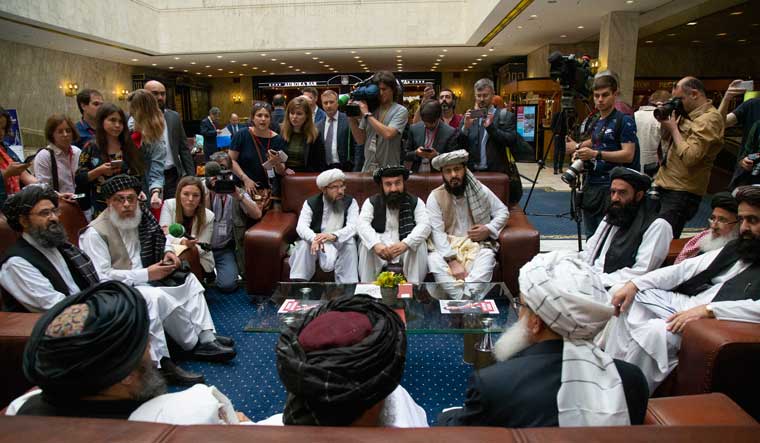For the second time, Russia has managed to demonstrate that it is a power to contend with in Afghanistan. A Taliban delegation, headed by heavy-weight Mulla Baradar, met Afghan representatives in the second round of talks. This is the first time that the political deputy and the co-founder of the Taliban made a public appearance. In a significant step in the long and complicated road to peace in Afghanistan, Russia is back in the great game.
Russia is holding the meeting at a commemoration of a 100 years of diplomatic relations with Afghanistan. The inclusion of Bardar—the real star in the talks—adds heft to the discussions. He has recently been released from a Pakistani prison on request by the Americans to sweeten the deal for the Taliban for their negotiations. "He has been in the meetings. We have exchanged views. There is hope that with his inclusion, things will change. We think they will take peace more seriously,'' Fawzia Koofi, one of the only two women leaders representing Afghanistan, told THE WEEK from Moscow. This is the second time Koofi has attended the Moscow conference. There has been some discussion between the delegation. “Women have expressed their views strongly,'' said Koofi, a vocal advocate for women's rights. “We have to get more serious in terms of what we want. Each time we meet and there is no outcome, Afghan people lose patience and trust.”
Also read
The Afghan team hopes to make progress in at least having some basic agreements in place before the complicated process of peace is actually hammered out.“We have requested the Taliban for a ceasefire,'' said Koofi. The peace negotiations have come at a high price with high civilian casualties. “We want the Taliban to stop at least attacking civilians,'' she said. A 14-member Taliban, led by Baradar, met the Afghan delegation represented by ex-president Hamid Karzai. The other members included Atta Mohammad Noor, a powerful figure from northern Afghanistan; Ghani's former national-security adviser Hanif Atmar, who is contesting the presidential election; and Omar Zakhilwal, the ambassador to Pakistan. Two women were also present, including lawmaker Fawzia Koofi.
A ceasefire, if agreed upon, would be a significant takeaway. One that the Americans were hoping to negotiate, but failed. In an opening statement on Tuesday, Russian foreign minister Sergey Lavrov—in a certain dig at America—said: “This conflict in Afghanistan has no military solution and the only way to settle this issue is to rely on diplomacy and politics. We believe all foreign military [forces] should be withdrawn from the country and the society of Afghanistan should unite in finding a solution.''
Things have changed on the ground since the last Moscow conference where India had sent its first unofficial and official representations. The Doha format, which had been confident of a peace deal soon, has realised that the negotiations will take time. So far, despite attempts and American pressure, the Taliban had refused to sit across the table with the Afghan government. There was an almost breakthrough. A date was agreed on. But the Afghan delegation was a plane-load with over 200 members. And Taliban cancelled the talks at the last minute.
Russia seems to have managed to make some progress. Is the Moscow format an addition to the US process or in opposition? “I think it is a help,'' said Koofi. “It will help the Doha process. In fact, one of the recommendations we have is to have a date for the Doha talks, to get a green light for it.''
This would be another tangible takeaway if agreed upon. One issue, which is likely to come up, and will be carefully analysed is any statement on women. In the Loya Jirga (grand assembly) held earlier this year to help formulate a peace map—where there was representation of women, the dissenting voices apart, there was consensus that the name of Afghanistan would not be open to change. Nor would there be any change regarding the status of women. This is one big concern for women who have come of their own in the past 14 years of the war. The possibility of the Taliban sharing power—which is now a reality in every peace process format that exist—can negate all the strides Afghan women have made. “I am disappointed that the representation of women at the conference since the last time has remained the same,'' Koofi said. For new Afghanistan, there was a need for more women to be included in the discussion. Maybe next time?



